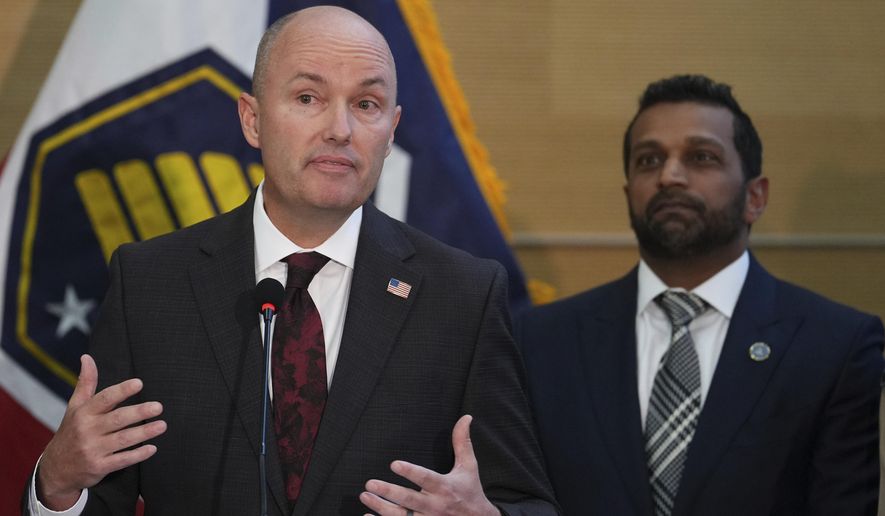As the nation prepares to “fall back” to Standard Time on Nov. 2, Sen. Tom Cotton, R-Ark., took to the Senate floor Tuesday to oppose a measure that would make Daylight Saving Time permanent and force millions of Americans to start their winter days in the dark.
Recalling how the United States experimented with eliminating Standard Time and adopting Daylight Saving Time year-round 51 years ago, Cotton said that the Sunshine Protection Act would “make winter a dark and dismal time” for people in his home state and many others across the country.
“In January of 1974, millions of Americans traveled to work and school in darkness,” the senator began. “Commuter trains were delayed.”
“Schoolchildren carried flashlights,” he said. “Tragically, some of these kids were struck by cars and killed while walking to school in the dark.”
One woman at the time told The New York Times that she couldn’t “cope anymore” and was “just staying in bed.”
“What calamity had befallen our nation?” Cotton asked. “Had Soviet Russia finally attacked America?”
“Had we suffered a nationwide power outage?” he continued. “Were the heavens conspiring to plunge our nation into darkness?”
No, he told his colleagues, “The answer was more mundane – and foolish.”
“A few months earlier, Congress in its eternal wisdom had imposed a top-down change on every American’s daily life, eliminating Standard Time and adopting Daylight Savings Time year-round,” Cotton said. “Such a change to the nation’s clocks had never happened before, except as an emergency rationing measure during wartime.”
“While briefly popular, it proved deeply unpopular when reality set in,” he said. “According to opinion polls, support for permanent Daylight Savings Time fell by 30 percentage points in just three months. Only a few weeks after it was implemented, it was underwater.”
Congressional lawmakers then “beat a hasty retreat,” Cotton said, “repealing the law and changing the clocks back in October. The experiment that was originally intended to run for two years “ended in abject failure after less than one.”
The Arkansas Republican then said that if Congress passes the Sunshine Protection Act, it would have proven that it failed to learn from the 1974 experiment.
“By moving the clock back an hour in winter, permanent Daylight Savings Time would push winter sunrises to an absurdly late hour, depriving Americans of morning sunshine that’s essential for our safety and well-being,” he said.
“For many Arkansans, permanent Daylight Savings Time would mean the sun wouldn’t rise until after 8 or even 8:30 a.m. during the dead of winter,” he pointed out. “Three months out of the year, kids in towns like Bentonville, Fayetteville and Fort Smith would start school ahead of the sun.”
For Americans living in northern states or in western time zones, the situation would be even worse, Cotton argued.
“The sun wouldn’t rise until nearly 9 o’clock during winter in Seattle,” he said. “In Grand Rapids, the sun would rise as late as 9:15 a.m., and in Williston, North Dakota, they would not see the sun ’till almost 9:45 a.m.”
While the darkness of permanent Daylight Saving Time “would be especially harmful for schoolchildren and working Americans,” it would also penalize “construction workers, farmers and others who rise before the sun or need the sun to work” because it would increase the amount of time they’re in the dark.
Enacting such a monumental change, the senator said, could hurt the quality of life for people starting their days in darkness, and could also impact their safety.
He noted that clock changes “can be bad for health” as the “best evidence suggests that the natural rhythms of our internal body clocks align more closely with Standard Time.”
Like most Americans, Cotton said he’s not a fan of the biannual clock change but argued “there’s not much to be done” about it.
“Not every human problem has a legislative solution,” he said. “Sometimes we have to live with an uneasy compromise between competing priorities and interests.”
“That’s doubly true when considering how the movement of the stars and the planets affects the lives of 350 million souls spread across our vast continental nation,” Cotton said.
© 2025 Newsmax. All rights reserved.























